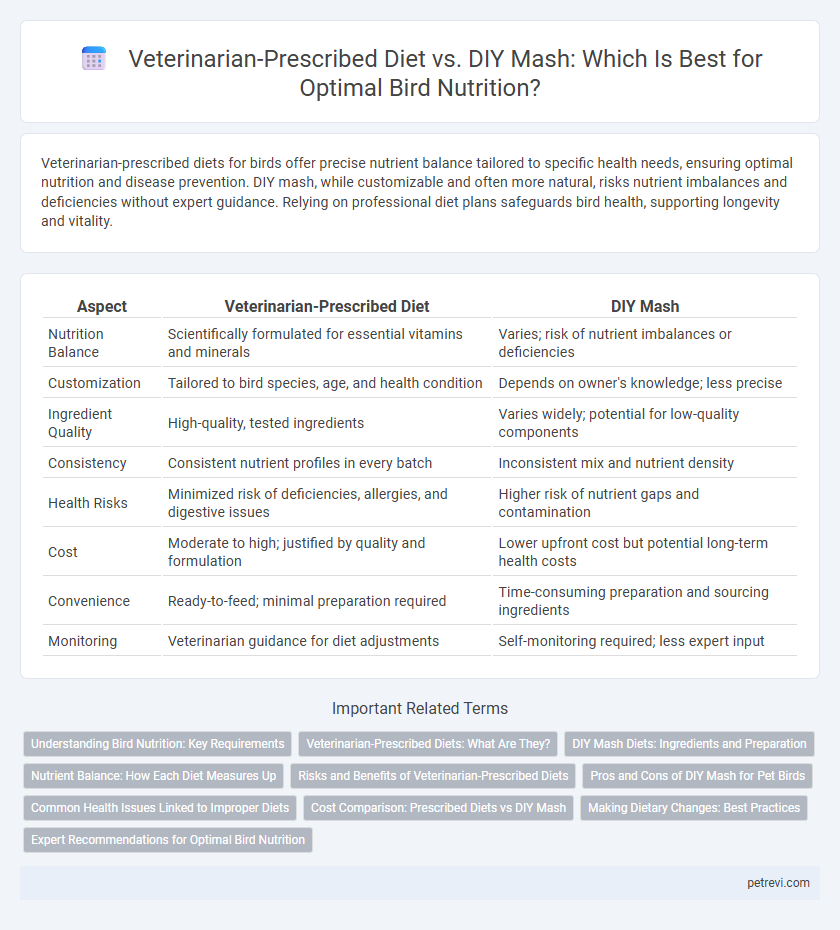Veterinarian-prescribed diets for birds offer precise nutrient balance tailored to specific health needs, ensuring optimal nutrition and disease prevention. DIY mash, while customizable and often more natural, risks nutrient imbalances and deficiencies without expert guidance. Relying on professional diet plans safeguards bird health, supporting longevity and vitality.
Table of Comparison
| Aspect | Veterinarian-Prescribed Diet | DIY Mash |
|---|---|---|
| Nutrition Balance | Scientifically formulated for essential vitamins and minerals | Varies; risk of nutrient imbalances or deficiencies |
| Customization | Tailored to bird species, age, and health condition | Depends on owner's knowledge; less precise |
| Ingredient Quality | High-quality, tested ingredients | Varies widely; potential for low-quality components |
| Consistency | Consistent nutrient profiles in every batch | Inconsistent mix and nutrient density |
| Health Risks | Minimized risk of deficiencies, allergies, and digestive issues | Higher risk of nutrient gaps and contamination |
| Cost | Moderate to high; justified by quality and formulation | Lower upfront cost but potential long-term health costs |
| Convenience | Ready-to-feed; minimal preparation required | Time-consuming preparation and sourcing ingredients |
| Monitoring | Veterinarian guidance for diet adjustments | Self-monitoring required; less expert input |
Understanding Bird Nutrition: Key Requirements
Veterinarian-prescribed diets for birds are scientifically formulated to meet essential nutritional requirements, ensuring balanced protein, vitamins, minerals, and amino acids tailored to specific species. DIY mash recipes often lack precise nutrient ratios, risking deficiencies or excesses that can impair feather quality, immune function, and overall health. Understanding bird nutrition highlights the importance of calibrated intake to support metabolism, organ function, and longevity in avian companions.
Veterinarian-Prescribed Diets: What Are They?
Veterinarian-prescribed diets for birds are scientifically formulated nutrition plans tailored to address specific health conditions or dietary deficiencies, ensuring optimal nutrient balance. These diets often come as specialized pellets or therapeutic food blends designed to prevent illnesses like obesity, liver disease, or malnutrition. Following a veterinarian's guidance on these diets enhances the bird's overall health and longevity by providing precise nutrient control beyond what DIY mash recipes typically offer.
DIY Mash Diets: Ingredients and Preparation
DIY mash diets for birds often include a balanced mix of grains, seeds, legumes, and fresh vegetables to provide essential nutrients such as proteins, fibers, vitamins, and minerals. Proper preparation involves thoroughly washing all ingredients, cooking grains and legumes to improve digestibility, and finely chopping or mashing components to facilitate easy consumption and nutrient absorption. Careful formulation tailored to specific bird species ensures optimal health benefits, promoting a natural, varied diet that supports immune function and feather quality.
Nutrient Balance: How Each Diet Measures Up
Veterinarian-prescribed diets for birds offer precise nutrient balance, formulated to meet species-specific requirements, ensuring optimal health and preventing deficiencies or excesses. DIY mash diets often vary in nutrient consistency due to ingredient quality and preparation methods, potentially leading to imbalances in vitamins, minerals, and protein levels. Regular analysis and adjustments in DIY diets are essential to approach the comprehensive nutrient profile achieved by professional formulations.
Risks and Benefits of Veterinarian-Prescribed Diets
Veterinarian-prescribed diets for birds provide balanced nutrition specifically formulated to meet species-specific needs, minimizing the risk of nutrient deficiencies or toxicities often associated with DIY mash preparations. These commercial diets undergo rigorous quality control and are backed by scientific research to ensure optimal health outcomes, supporting immune function and longevity in avian patients. Relying on professional guidance reduces the chance of imbalanced nutrition-induced diseases such as hypovitaminosis or metabolic bone syndrome common in improperly mixed DIY diets.
Pros and Cons of DIY Mash for Pet Birds
DIY mash for pet birds offers the advantage of customized nutrition tailored to individual dietary needs and preferences, often using fresh, whole ingredients that can enhance nutrient diversity. However, the potential drawbacks include the risk of imbalanced nutrient profiles without precise formulation, time-consuming preparation, and the need for ongoing research to ensure all vitamin and mineral requirements are met. In contrast, veterinarian-prescribed diets provide scientifically balanced nutrition with convenience, though they may lack the personalization and ingredient variety found in DIY options.
Common Health Issues Linked to Improper Diets
Veterinarian-prescribed diets for birds are formulated to address and prevent common health issues such as obesity, malnutrition, and vitamin deficiencies often linked to DIY mash recipes lacking balanced nutrients. Improper diets can lead to hepatic lipidosis, weakened immune systems, and metabolic bone disease, conditions prevalent in birds fed unregulated home-prepared meals. Using a vet-approved diet ensures optimal nutrient ratios essential for maintaining feather quality, organ function, and overall longevity.
Cost Comparison: Prescribed Diets vs DIY Mash
Veterinarian-prescribed diets for birds often involve higher upfront costs due to specialized ingredients and formulation tailored to avian nutritional needs, ensuring balanced nutrient intake and promoting optimal health. DIY mash, while more affordable initially, can lead to nutritional imbalances if not carefully researched and prepared, potentially resulting in higher long-term veterinary expenses. Evaluating cost-effectiveness requires considering both immediate food expenses and potential health-related costs over time.
Making Dietary Changes: Best Practices
Veterinarian-prescribed diets for birds provide balanced nutrition tailored to specific health needs, ensuring essential vitamins and minerals are met accurately. When making dietary changes, introduce new foods gradually over 7 to 10 days to monitor tolerance and prevent digestive upset. Regular consultation with an avian vet is crucial to adjust the diet based on the bird's health status and avoid nutritional deficiencies common in DIY mash formulations.
Expert Recommendations for Optimal Bird Nutrition
Veterinarian-prescribed diets for birds provide balanced nutrition tailored to species-specific needs, ensuring essential vitamins, minerals, and proteins are precisely delivered. DIY mash often lacks consistency and may omit critical nutrients, leading to potential deficiencies or health issues. Experts recommend consulting avian veterinarians to formulate diets that support optimal growth, feather quality, and immune function.
Veterinarian-prescribed diet vs DIY mash for Bird nutrition Infographic

 petrevi.com
petrevi.com